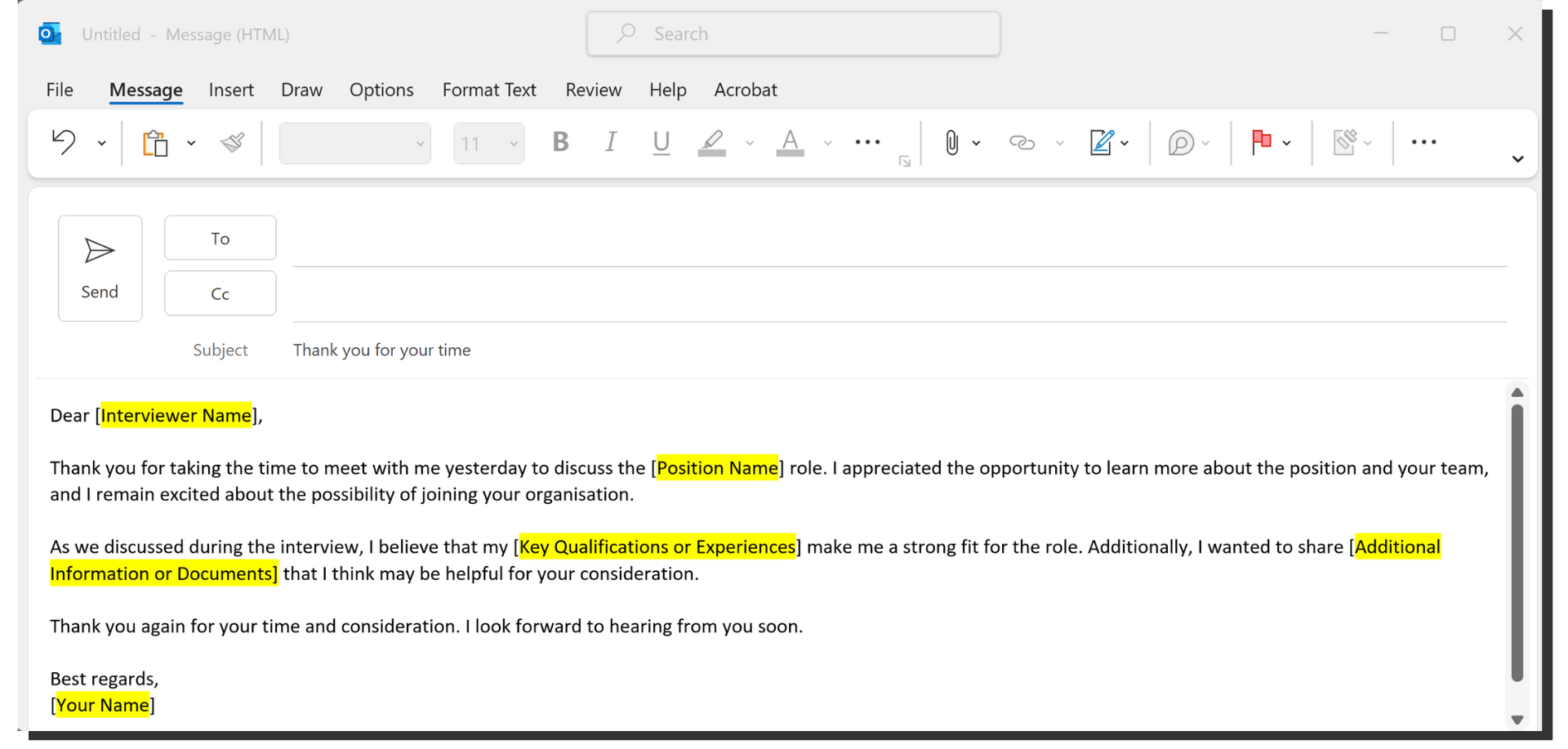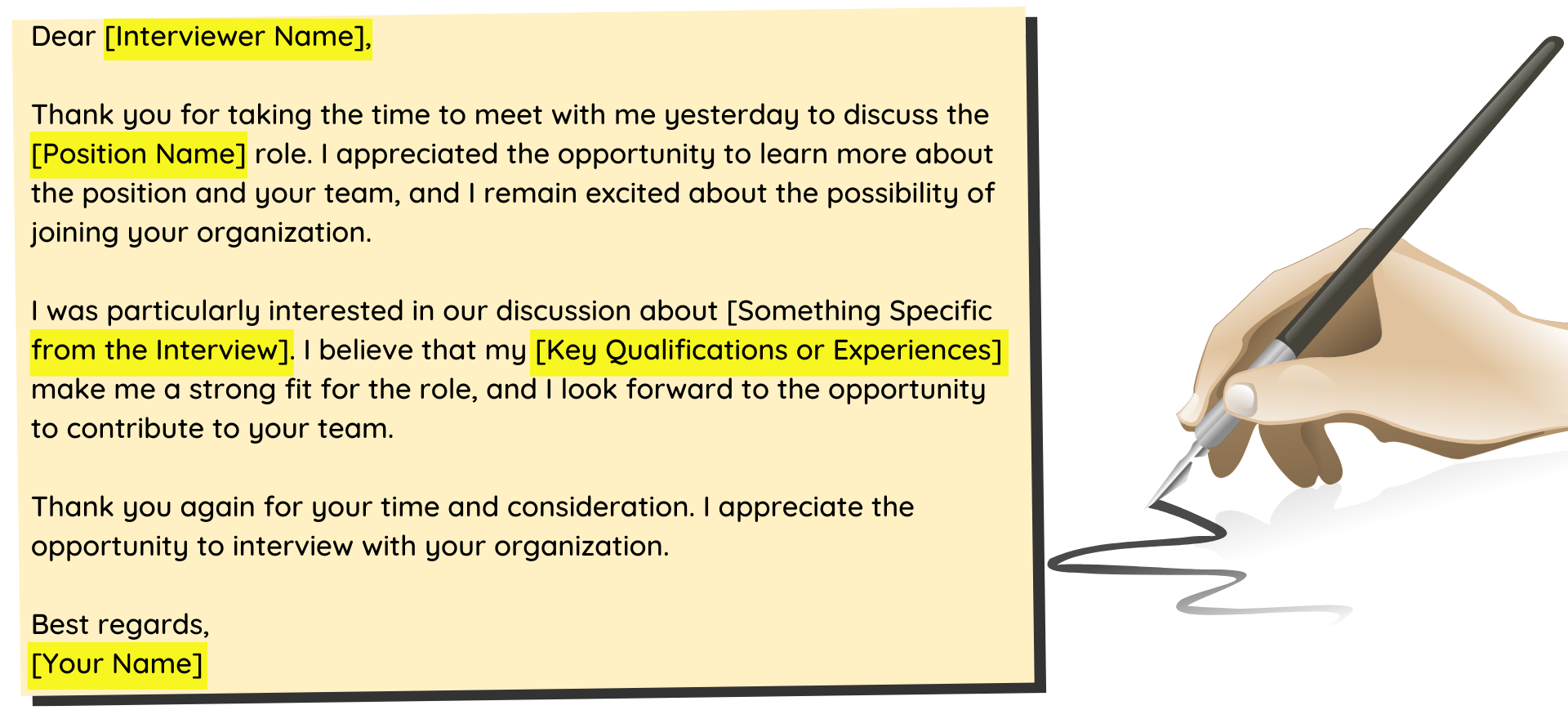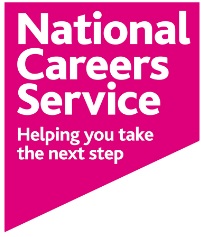Are you wondering what to do after a job interview? Interview follow ups are crucial in the job search process, helping you to stand out from other candidates and increasing your chances of getting hired.
In this blog post, we discuss interview follow ups and provide tips for crafting effective follow up communications. Whether you prefer to send an email, make a phone call, or write a thank-you note, we’ve got you covered.
Types of Interview Follow-up
There are several types of follow-up you can use after an interview. The most common types include sending an email, making a phone call, or writing a thank you note. Each method has its own advantages and disadvantages, and the best approach depends on the company culture and interviewer preference.
Email follow-up is the most common, as it allows you to quickly and easily communicate your appreciation and interest in the position. An email follow-up should typically be sent within 24 hours after the interview to show your continued interest in the position.
A phone call follow-up can be more personal and can allow you to further express your enthusiasm for the role. However, a phone call follow-up should be made only if the interviewer has specifically requested it, or if you have not received a response to your email within a week.
Another effective method of follow up is writing a thank you note. This approach can be particularly useful if you want to show your appreciation for the interviewer’s time and reiterate your interest in the position. Thank you notes can be sent by email or traditional mail, and should be personalised and professional in tone.
Tips for Writing an Interview Follow up Email
Crafting an effective interview follow-up email can help you make a positive impression on the hiring manager and stand out from other candidates. Here are some tips to keep in mind:
- Start with a thank you note: Begin your email by thanking the interviewer for their time and expressing your appreciation for the opportunity to discuss the position.
- Reiterate your interest in the position: Use the email to reiterate your interest in the position and highlight any key qualifications or experiences that make you a good fit for the role.
- Provide any additional information: If there was something you forgot to mention during the interview, or if the interviewer asked for additional information, include it in your follow-up email.
- Be professional and concise: Keep your email professional and concise, and avoid any spelling or grammar errors. Remember to proof-read your email before sending it.
- Personalise your email: Personalise your email by mentioning something specific that you discussed during the interview, such as a shared interest or a project that you found particularly interesting.
Here’s an example of an effective interview follow-up email:

For a version you can copy and paste, click Read More
Dear [Interviewer Name],
Thank you for taking the time to meet with me yesterday to discuss the [Position Name] role. I appreciated the opportunity to learn more about the position and your team, and I remain excited about the possibility of joining your organization.
As we discussed during the interview, I believe that my [Key Qualifications or Experiences] make me a strong fit for the role. Additionally, I wanted to share [Additional Information or Documents] that I think may be helpful for your consideration.
Thank you again for your time and consideration. I look forward to hearing from you soon.
Best regards,
[Your Name]
Tips for Making an Interview Follow-up Phone Call
Making a phone call can be an effective way to follow up after an interview, especially if you want to express your enthusiasm for the position. Here are some tips to keep in mind:
- Call at an appropriate time: Avoid calling early in the morning or late in the evening, and make sure to call during normal business hours.
- Be prepared: Before you call, review your notes from the interview and prepare a script or talking points to guide the conversation.
- Be polite and professional: Remember to be polite and professional on the phone, and avoid being too pushy or aggressive.
- Express your interest: Use the phone call as an opportunity to express your interest in the position and ask if there are any next steps in the hiring process.
Here’s an example of an effective phone script for interview follow-up:

For a version you can copy and paste, click Read More
Hello, this is [Your Name]. I wanted to follow up on my recent interview for the [Position Name] role. I enjoyed speaking with [Interviewer Name] and learning more about the position and your team. I wanted to express my continued interest in the role and inquire about any next steps in the hiring process. Thank you for your time and consideration.
Crafting a Thank You Note
Even in our modern day, a thank you note is a great way to follow up and show your appreciation for the interviewer’s time. Here are some tips to keep in mind:
- Be timely: Send your thank you note within 24 hours after the interview. This to shows your appreciation and continued interest in the position.
- Be personal: Personalise your thank you note by mentioning something specific that you discussed during the interview, such as a shared interest or a project that you found particularly interesting.
- Be professional: Keep your thank you note professional and avoid any overly casual or informal language.
- Express your gratitude: Express your gratitude for the interviewer’s time and reiterate your interest in the position.
- Send a separate note to each interviewer: If you interviewed with multiple people, send a note to each one.
Here’s an example of an effective thank-you note:

For a version you can copy and paste, click Read More
Dear [Interviewer Name],
Thank you for taking the time to meet with me yesterday to discuss the [Position Name] role. I appreciated the opportunity to learn more about the position and your team, and I remain excited about the possibility of joining your organization.
I was particularly interested in our discussion about [Something Specific from the Interview]. I believe that my [Key Qualifications or Experiences] make me a strong fit for the role, and I look forward to the opportunity to contribute to your team.
Thank you again for your time and consideration. I appreciate the opportunity to interview with your organization.
Best regards, [Your Name]
Following up after an interview can help you stay top-of-mind with the hiring manager. Whether you choose to send an email, make a phone call, or craft a thank you note, remember to be professional, courteous, and enthusiastic. With these tips in mind, you’ll be well on your way to standing out from the competition. Good luck!
But, if you’re also interviewing for other job positions, why not check out our Interview Preparation blog?
The National Careers Service offers free advice about careers and skills to anyone aged 13 or over and living in England. To speak to a professional careers adviser, call 0800 100 900 or use webchat (8am – 8pm Monday – Friday; 10am – 5pm Saturday)
